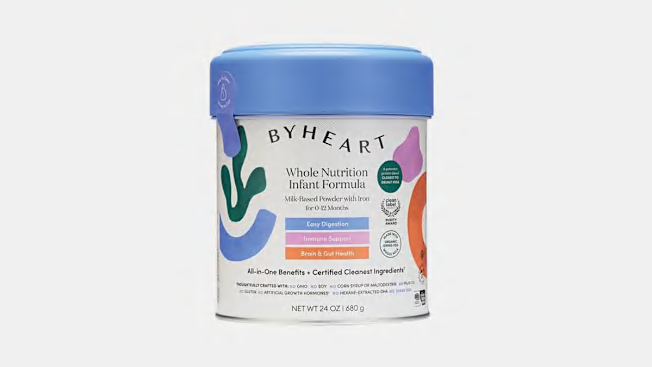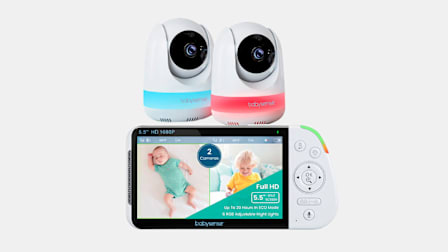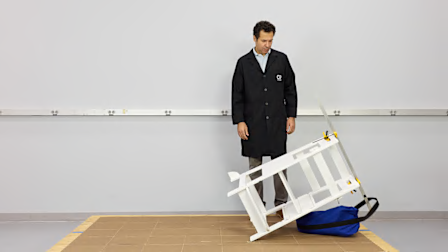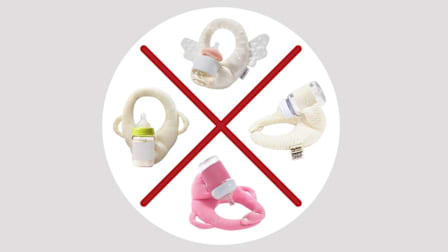All ByHeart Infant Formula Recalled for Botulism Risk
23 infants have been hospitalized in 13 states. No deaths have been reported.

ByHeart has announced a nationwide recall of all its infant formula, including all cans and single-serve packs, due to the risk of infant botulism. If you have ByHeart formula, stop using it immediately. Twenty-three infants in 13 states have been hospitalized for infant botulism in cases linked to ByHeart formula, according to an FDA announcement on Friday, Nov. 14. No deaths have been reported. A public health investigation is ongoing.
If you have any ByHeart Whole Nutrition Infant Formula, stop using the formula immediately and follow the steps below. If your child has consumed ByHeart formula and is showing signs of botulism, such as muscle weakness, poor feeding, loss of head control, or difficulty swallowing, seek immediate medical care.
Due to the ongoing investigation, the FDA recommends taking the following steps before discarding the formula.
• Take a photo of or write down the lot numbers and use-by dates on the bottom of the can or packs.
• Keep the formula in a secure, temperature-controlled place, labeling with “DO NOT USE.”
• After 30 days, if no symptoms of infant botulism appear, you can discard the formula.
Infant botulism is rare, but it can be fatal if left untreated. According to Mona Amin, DO, a pediatrician and the founder of Peds Doc Talk, the risk is greatest for infants under 6 months. “The reassuring news is that almost all babies who do get infant botulism recover completely with prompt treatment,” she says. “Staying informed and observant is the best thing parents can do.”
If your baby has been fed with ByHeart formula, it’s important to switch your baby’s formula to another brand right away and to watch for signs of infant botulism in your baby. We have more advice on both topics below.
What Is Infant Botulism?
Infant botulism is one of five types of botulism that are primarily caused by a neurotoxin produced from the spores of Clostridium botulinum.
Infant Botulism Symptoms
In babies, symptoms of infant botulism can take weeks to appear, but may initially include constipation and difficulty feeding. It can progress to loss of muscle tone and difficulty breathing. It’s most common in babies under 12 months of age.
Symptoms of infant botulism may include:
• Constipation.
• Poor feeding, including difficulty sucking and swallowing.
• Loss of head control.
• A weak and altered cry.
• Diminished facial expression, including drooping eyelids and sluggish pupils.
• Other signs of muscle weakness.
• Breathing difficulty.
Botulism is a medical emergency. If you’re noticing any of the above symptoms in your baby, seek prompt medical attention.
Infant Botulism Treatment
Infant botulism can be treated with an antitoxin known as BabyBIG, which can be requested from the California Department of Public Health (CDPH), the world’s only producer of the antitoxin. After noticing a spike in treatment requests that were all linked to ByHeart formula, California public health officials notified the CDC of a possible outbreak.
How Could the Botulism Toxin Get Into Infant Formula?
The presence of C. botulinum is rare in infant formula, but it’s important to note that powdered infant formula is not considered to be sterile, unlike ready-to-feed formula. The spores can be naturally found in the environment, including in soil, dust, and some vegetables.
“It is possible that the spores from C. botulinum came from contaminated ingredients or from the environment,” says James E. Rogers, PhD, Consumer Reports’ director of product and food safety research and testing, whose team led CR’s testing on infant formula contaminants in early 2025. “And even if the product is heat-treated to kill or reduce the number of live bacteria, C. botulinum spores are heat-resistant and would survive the process.”
Is Infant Formula Tested for the Botulism Toxin?
The FDA requires that formula makers test for cronobacter and salmonella species in the finished product, Rogers says. According to ByHeart, testing for the C. botulinum toxin is not part of current practice among formula manufacturers.
“Currently, global regulatory and scientific authorities do not recommend testing powder infant formula for Clostridium botulinum,” Devon Kuehn, MD, ByHeart chief medical officer and chief scientific officer, told CR by email. Kuehn also said no U.S. or global infant formula company is required to test for the toxin. “We adhere to the rigorous safety and quality standards and have the utmost confidence in our product, in our safety systems, and in the people behind them,” she said.
About the ByHeart Infant Formula Recall
Twenty-three cases of infant botulism have been reported in the following states. All cases have a direct link to ByHeart formula, though testing is ongoing. In 2022, five lots of ByHeart infant formula were recalled after a sample tested positive for Cronobacter sakazakii, a rare but dangerous bacterium.
Infant botulism cases have been reported among infants consuming ByHeart formula in these states: Arizona, California, Illinois, Kentucky, Michigan. Minnesota, New Jersey, North Carolina, Oregon, Pennsylvania, Rhode Island, Texas, and Washington
ByHeart Infant Formula Recall Details
The recalled formula was sold at byheart.com and at major retailers nationwide, including Amazon, Kroger, Target, Sam’s Club, Walmart, and Whole Foods, the FDA says. The illnesses were first reported in August 2025, with the most recent illness onset reported in November 2025.
Lot Numbers Recalled
• All lots of ByHeart infant formula are being recalled.
• All packages, including both cans and single-serve Anywhere sticks, are being recalled.
The problem: Twenty-three infants across 13 states who have consumed ByHeart powdered infant formula have been hospitalized with suspected or confirmed cases of infant botulism.
Company response: The CDPH confirmed that one previously opened sample of formula from one of the initial recalled batches tested positive. In a statement on the company’s website, ByHeart said that “testing from a previously-opened can lacks scientific basis to establish causation between the product and illness.”
The company said that it has enlisted a third-party independent testing laboratory to test infant formula from unopened cans and that so far, no unopened cans of formula have tested positive for C. botulinum. But additional testing is underway.
“We take the CDPH’s results seriously and we are actively working in partnership with CDPH, FDA, and CDC on their comprehensive investigation,” Kuehn said. “We are committed to getting to the bottom of it.”
“Detection of Clostridium botulinum in infant formula is difficult, and a negative test result does not rule out the presence of the bacteria in the product,” the FDA said in the recall announcement.
According to publicly available data from the FDA, a January 2024 inspection by the FDA of ByHeart’s Pennsylvania infant formula manufacturing facility resulted in several citations for unsanitary conditions and the potential for contamination of raw materials at the facility. There was also a citation for lack of pest control. The FDA sent ByHeart a warning letter in 2023 reflecting similar concerns after the 2022 recall for Cronobacter sakazakii risk.
“It’s very troubling that ByHeart appears to not have adequately addressed the FDA’s concerns over the serious problem involving unsanitary and contamination risk conditions at their plant,” says Brian Ronholm, head of food policy for CR. Drastic budget cuts and a federal government shutdown also limit the “ability of regulators to manage how the outbreak is communicated,” Ronholm says. It’s unclear how long the ByHeart formula investigation may take.
What consumers can do next: Stop using any ByHeart formula and switch to a new baby formula immediately. Write down or photograph the lot numbers of formula and store it securely for 30 days, or check with your local health department before disposing of it. You can reach out to hello@byheart.com for information, or call 833-429-4327.
If you have recalled formula, wash all items and surfaces in hot soapy water or in a dishwasher, the CDC says. Consider throwing out any bottles or feeding items that may have come into contact with the formula and replacing them.
To report an illness, contact your state’s local health department, fill out the FDA’s MedWatch Online Voluntary Reporting Form, or call an FDA Consumer Complaint coordinator.
How to Switch Formulas
If you were using ByHeart formula to feed your baby, it’s important to switch to a different formula right away because of the risk of infant botulism, medical experts say. Switching your baby’s formula can feel stressful, but it’s important not to panic. Infant botulism is rare, and even if your baby drank formula contaminated with botulism spores, it’s not a guarantee that they will automatically develop infant botulism. “That’s because the spores have to grow and release toxin inside the intestines for illness to occur, and that chain of events rarely happens,” says Mona Amin at Peds Doc Talk. “The risk is higher with exposure, but it’s far from certain.” Keep watching them, stay in touch with your pediatrician, and try not to panic, she says.
To minimize the risk of exposure, it’s best to make an immediate switch rather than trying to switch gradually. Most babies do fine switching between formula brands when needed, according to the CDC.
Here’s how to ensure a smooth transition when switching formula:
• Offer the new formula when your baby is hungry but not fussy, typically the first feed of the day.
• Stick to your normal feeding schedule and routines to minimize other changes.
• Watch your baby for signs of how they’re digesting the new formula. Spit-up, fussiness, gas, and looser stools can all be normal as your baby adjusts. Severe signs like rash, hives, forceful vomiting or blood in their stool can be a sign that they are having an adverse reaction to their new formula.
• Stay patient: It can take seven to 10 days for your baby to fully adjust to a new formula. It’s best to minimize other feeding changes or new foods during this transition.
If you have specific questions about your baby’s formula or nutrition, your pediatrician is your best resource.
Choosing a new formula? CR’s baby formula buying guide has expert-backed information on what to look for. Read more about how CR tests infant formula.
Safely Switching Formula
Dr. Bridget Young
Bridget Young, PhD, of Baby Formula Expert shares advice for parents affected by the ByHeart formula recall, including alternative formulas with similar proteins and carbohydrates that your baby may tolerate well.
CREDIT: Instagram.com/babyformulanutrition
Should You Sanitize Baby Bottles That May Be Contaminated With Botulism, or Discard Them?
If you have any ByHeart baby formula, the CDC recommends washing any baby bottles and other items or surfaces that may have come into contact with the formula using hot, soapy water or in a dishwasher cycle. Because the dormant spores of C. botulinum are particularly heat-resistant and are able to survive in temperatures up to 250° F, if you’re concerned about potential exposure to C. botulinum spores, you may consider throwing out any bottles, nipples, and pacifiers that have come into contact with the powdered infant formula and replacing them with new ones.
An Infant Formula Shortage Is Unlikely
According to the FDA, ByHeart produces approximately 1 percent of the nation’s infant formula, and this recall is not expected to cause a formula shortage or drastically affect the country’s formula supply.
As a reminder, medical experts strongly advise against making your own baby formula because doing so can result in dangerous nutritional deficiencies or contamination.
Learn more about how Consumer Reports tests infant formula for contaminants such as heavy metals, acrylamide, and BPA, and find the products that exceed our safety expectations.
How to Get a Refund on Recalled ByHeart Formula
Now that all ByHeart products have been recalled, it’s reasonable to expect a refund for cans of formula you can no longer use. But how much of a refund you may be able to get may depend on where you initially bought the formula.
Directly From ByHeart
On Friday, Nov. 14, ByHeart announced that those who purchased cans directly from ByHeart on or after Oct. 1, 2025, will be able to request a refund for up to two units of formula (either two cans, two Anywhere packs, or one can plus one Anywhere pack). First-time ByHeart customers are eligible to receive a full refund on their first order, regardless of the quantity.
The company has opened a hotline (866-201-9069), which they say is running 24/7, to manage refund requests. On its website, the company states that it is not replying to emails at this time.
On the company’s Instagram post announcing the refund information, commenters have shared that when they called the company to request a refund, they were asked to provide the lot numbers from the bottoms of the cans, but earlier notices from the company directed consumers to discard all recalled products. Commenters are also expressing frustration at the limited nature of the refund policy, stating that many families have more than two cans of formula on hand, for which they will not be refunded under ByHeart’s policy.
Amazon, Target, or Other Retailers
If you purchased ByHeart formula at a retail store or online, you should be eligible for a full refund of your entire purchase, including opened cans. Bring in proof of purchase along with proof of the recall, or call the retailer’s customer service department to speak to an agent who can help process your request.
Credit Card Charge-Backs
Some commenters on ByHeart’s Instagram post state that they’ve had success initiating charge-backs on the credit cards used to purchase ByHeart formula directly from the company. Success with this method may vary depending on your credit card company, but it’s worth trying, especially if you have more than two units on hand you’d like to be refunded for. When you call your credit card company’s customer service, provide proof of the recall.
Editor’s Note: This article, originally published Nov. 10, 2025, has been updated to reflect the expanded ByHeart formula recall and to update the current number of infant hospitalizations, as well as to provide information on switching infant formula and sterilizing bottles or items that may have come into contact with botulism spores. Refund information has also been added.




